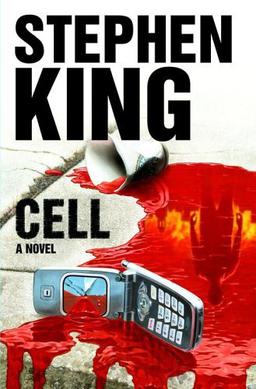A Z-Realm listener set me up with an audio book version of Stephen King's 2006 novel,
Cell. I'm not a huge Stephen King fan. I have nothing against his work, but I don't seek it out either. I read
Firestarter in high school, and I listened to the audio book versions of the first two novels in the
Dark Tower series.
Of course, I was interested in Cell because it is a sort of
zombie apocalypse story. Here the zombies are not walking corpses. Rather, they are the sort of "zombies" that we see in movies like
28 Days Later, which is to say that they are living human beings who have been driven into a homicidal berserker rage. In 28 Days Later, it was a virus that turned people into rage monsters. In Cell, there is an event that people call the Pulse which has the same effect on anybody who makes or receives a cell phone call. I haven't read much about the book, as I'm looking to avoid spoilers, but what little I have read describes it as deeply technophobic. Certainly Stephen King uses the setup as a tool to skewer the obnoxious behavior which cell phones seem to prompt people to engage in, but I don't get the impression that this is Stephen King's only, or even primary, objective.
What the cell-phone-as-madness-vector does for the story is set up an inventive but plausibly frightening
positive feedback loop. At first, when the Pulse turns people who are on their phones into rabid monsters, the effects are obvious and immediate but not all-encompassing. Once the chaos of the zombie apocalypse begins to unfold, however, it picks up speed as people respond to the crisis by pulling out their phones and either calling for help or using their phones to try to find out what's going on. By the time enough people identify their cell phones as the means of infection the chaos has progressed beyond anyone's ability to bring the situation back under control. I don't know if there is any other way by which the infection spreads in the novel. So far, I've seen no indication that zombies can infect their victims with a bite, as is the norm in Romero-style zombie tales.
The novel really delivers in the area in which many zombie apocalypse tales fall short; namely in depicting the actual moment of apocalypse. In 28 Days Later, as well as in
The Walking Dead, the main character wakes up to the aftermath of the apocalypse. For me the most fascinating aspect of the zombie apocalypse narrative is the one that, for filmmakers, is the most expensive and difficult to portray. I'm talking about the chaos that ensues in densely populated areas after the spreading panic passes a critical threshold. Regardless of how far it deviates from its source material, I hope that the big-budget Brad Pitt version of
World War Z is able to deliver in this respect. From what I've seen of
leaked footage on the Internet, I think I have reasons for hope. In the meantime however, it is mainly on the page that this moment of spreading panic and breakdown finds its fullest expression.
I don't know what Stephen King's attitude is toward cell phones (the novel is not such a screed that the author's actual opinions leap off the page), but I do wonder if he realized just how quickly his novel would become a period piece. The novel was published in 2006, and so there are no smart phones. Early in the novel a teenage girl takes her phone off of a belt clip, which struck me as pretty unlikely even for 2006. I remember at that time I was using a Nokia bar phone which I kept in a holster on my belt. I remember a checkout clerk at a nearby grocery store commenting to a coworker about how only middle-aged men wore such things. Wired magazine advised would-be techno-hipsters to ditch the Batman-style utility belt and keep their phones in their pockets. One of Cell's trio of protagonists, a 15-year-old girl, explained that her father was a successful businessman and gadget head, and that he had a super deluxe cell phone that included a camera and Internet access. How quaint this seems in 2012.
-KMO




